Fleurs du Mal Magazine


Or see the index
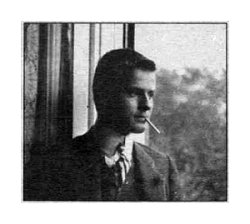
Hans Leybold
(1892-1914)
Traum der Sehnsucht
Wie oft hab ich meine Arme ausgebreitet
In der Nacht
Und hab gelegen
Und hab gewacht
Und hab gewartet auf dich …
Du musstest einmal kommen,
Und du kamst!
Du musstest kommen
Und du nahmst
All dies einsamgraue, öde Elend fort …
Du kamst wie ein Rosenhauch
In den Raum
Und knietest an meinem Bette –
Mir war’s wie ein Traum …
Und meine Arme schlossen sich
Sanft um deine gebeugte Gestalt.
Ich küsste Stirn dir und Haar,
Wieder und wieder … und mir war,
Als entzöge dich mir eine sanfte Gewalt …
Wo bliebst du … wo …?
Hart und roh
Schlägt mein Kopf an den Boden –!
Hans Leybold poetry
fleursdumal.nl magazine
More in: *War Poetry Archive, Archive K-L, Expressionism, Leybold, Hans
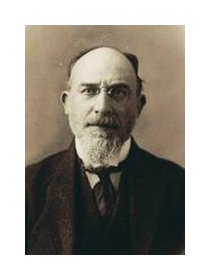
Erik Satie
(1866 – 1925)
Les Courses
La foule.
Le pesage.
Achat du programme.
Vingt et vingt.
Aux rubans.
Départ.
Ceux qui se dérobent.
Les perdants (nez pointus et oreilles tombantes.)
26 mars 1914
Erik Satie Les Courses
fleursdumal.nl magazine
More in: Archive S-T, Erik Satie, Satie, Erik

The Sorrows of Young Werther (60) by J.W. von Goethe
Charlotte was sitting alone. None of her family were near, and she gave
herself up to the reflections that silently took possession of her mind.
She was for ever united to a husband whose love and fidelity she had
proved, to whom she was heartily devoted, and who seemed to be a special
gift from Heaven to ensure her happiness. On the other hand, Werther had
become dear to her. There was a cordial unanimity of sentiment between
them from the very first hour of their acquaintance, and their long
association and repeated interviews had made an indelible impression
upon her heart. She had been accustomed to communicate to him every
thought and feeling which interested her, and his absence threatened to
open a void in her existence which it might be impossible to fill. How
heartily she wished that she might change him into her brother,–that
she could induce him to marry one of her own friends, or could
reestablish his intimacy with Albert.
She passed all her intimate friends in review before her mind, but found
something objectionable in each, and could decide upon none to whom she
would consent to give him.
Amid all these considerations she felt deeply but indistinctly that her
own real but unexpressed wish was to retain him for herself, and her
pure and amiable heart felt from this thought a sense of oppression
which seemed to forbid a prospect of happiness. She was wretched: a dark
cloud obscured her mental vision.
It was now half-past six o’clock, and she heard Werther’s step on the
stairs. She at once recognised his voice, as he inquired if she were at
home. Her heart beat audibly–we could almost say for the first time–at
his arrival. It was too late to deny herself; and, as he entered, she
exclaimed, with a sort of ill concealed confusion, “You have not kept
your word!” “I promised nothing,” he answered. “But you should have
complied, at least for my sake,” she continued. “I implore you, for both
our sakes.”
She scarcely knew what she said or did; and sent for some friends, who,
by their presence, might prevent her being left alone with Werther. He
put down some books he had brought with him, then made inquiries about
some others, until she began to hope that her friends might arrive
shortly, entertaining at the same time a desire that they might stay
away.
At one moment she felt anxious that the servant should remain in the
adjoining room, then she changed her mind. Werther, meanwhile, walked
impatiently up and down. She went to the piano, and determined not
to retire. She then collected her thoughts, and sat down quietly at
Werther’s side, who had taken his usual place on the sofa.
“Have you brought nothing to read?” she inquired. He had nothing. “There
in my drawer,” she continued, “you will find your own translation of
some of the songs of Ossian. I have not yet read them, as I have still
hoped to hear you recite them; but, for some time past, I have not been
able to accomplish such a wish.” He smiled, and went for the manuscript,
which he took with a shudder. He sat down; and, with eyes full of tears,
he began to read.
The Sorrows of Young Werther (Die Leiden des jungen Werther) by J.W. von Goethe. Translated by R.D. Boylan.
To be continued
fleursdumal.nl magazine
More in: -Die Leiden des jungen Werther, Goethe, Johann Wolfgang von
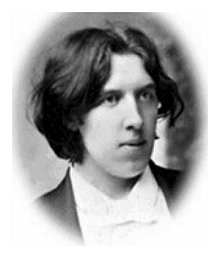 Antheia symposium
Antheia symposium
Voorstraat 125 Dordrecht
25 oktober 2014
Oscar Wilde
In naam van de schoonheid
Op 15 oktober 2014 is het 160 jaar geleden dat Oscar Wilde geboren werd. Om dit te vieren wordt een symposium georganiseerd onder de titel: ‘Oscar Wilde – In naam van de schoonheid’. Een unieke ontmoeting tussen de filosofie en de kunst. Zijn eigenzinnige manier van denken over kunst staat hierbij in het middelpunt. Met zijn ogen kijken we naar de werken van andere kunstenaars in de vaste collectie van het Van Gogh Museum, zoals die van Pierre Puvis de Chavannes, Camille Pisarro en Claude Monet. Edwin Becker (Van Gogh Museum) en Katja Rodenburg (Antheia) nemen u mee naar de fascinerende wereld van de filosofie en de esthetica, en de kunst van de tweede helft van de 19e eeuw en het fin-de-siècle.
De wereld is mijn podium door Katja Rodenburg
We ontmoeten Oscar Wilde op de belangrijkste momenten in zijn leven en werk. In woord en beeld volgen we zijn veelbelovende jaren in Oxford, zijn lezingentour in Amerika, zijn gedachten over mode en inrichting in Parijs en zijn triomf in de theaterwereld van London. De wereld is zijn podium. Totdat hij in de gevangenis in Reading terecht komt en daarna zijn laatste jaren als persona non grata in armoede in Parijs moet doorbrengen.
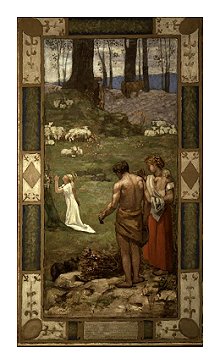 Met de blik van Oscar Wilde – verrassende werken uit de vaste collectie door Edwin Becker
Met de blik van Oscar Wilde – verrassende werken uit de vaste collectie door Edwin Becker
Oscar Wilde was gefascineerd door begrippen als ‘eros en thanatos’ en Japonisme, en was uitstekend op de hoogte van eigentijdse kunst, zoals de werken van Pissarro en Monet, via onder meer zijn bezoeken aan galerie Durand-Ruel. Hij was ook verzot op het werk van bijvoorbeeld een proto-symbolist als Pierre Puvis de Chavannes. Verrassende kunstwerken uit de collectie van het Van Gogh Museum van Redon, Stuck, De Feure, Puvis de Chavannes, Gauguin en vele anderen zullen worden besproken met de blik en visie van Wilde.
De schoonheid van een nieuwe tijd door Katja Rodenburg
Zijn leven lang zoekt Oscar Wilde naar een nieuwe schoonheid. Wij volgen de ontwikkeling van zijn denken over kunst aan de hand van zijn belangrijkste inspiratiebronnen. In het begin is dat vooral het werk van de Engelse Pre-Raphealite schilders en dichters, en de kunstcritici Walter Pater en John Ruskin. Maar al gauw zijn dat de boeken van Franse schrijvers, zoals Charles Baudelaire en Théophile Gautier. Wat betekent nu precies ‘l ‘art pour l’art’?
Programma:
v.a. 10.00 Ontvangst en registratie
10.30 Inleiding Katja Rodenburg
11.30 Korte pauze
12.00 Lezing Katja Rodenburg
13.00 Lunch
14.00 Lezing Edwin Becker
15.00 In gesprek met de deelnemers, gelegenheid tot vragen stellen en discussie met Edwin Becker en Katja Rodenburg
15.40 Feestelijke herdenking
16.00 Afsluiting
Over de sprekers
Edwin Becker is Hoofdconservator Tentoonstellingen van het Van Gogh Museum en kunsthistoricus. Hij is verantwoordelijk voor diverse tentoonstellingen, over kunstenaars als bijvoorbeeld Dante Gabriel Rossetti, Egon Schiele, John Everett Millais en thema’s als Kunstenaarslijsten (In Perfect Harmony) , Art Nouveau: la Maison Bing of Naturalisme (Illusie en werkelijkheid). Hij verzorgde verschillende essays en artikelen voor zowel de bijbehorende catalogi als andere publicaties.
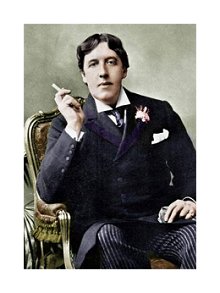 Katja Rodenburg is filosoof, leiderschaps -adviseur en tentoonstellingen-curator. Zij publiceerde onder andere Ik, Ophelia, over John Everett Millais en het werk van de fotografen Hellen van Meene, Rineke Dijkstra en Inez van Lamsweerde & Vinoodh Matadin en Armando en de melancholie van het scheppen, over de filosofische achtergronden van het werk van de kunstenaar Armando.
Katja Rodenburg is filosoof, leiderschaps -adviseur en tentoonstellingen-curator. Zij publiceerde onder andere Ik, Ophelia, over John Everett Millais en het werk van de fotografen Hellen van Meene, Rineke Dijkstra en Inez van Lamsweerde & Vinoodh Matadin en Armando en de melancholie van het scheppen, over de filosofische achtergronden van het werk van de kunstenaar Armando.
Voor berichten en artikelen rond filosofie, kunst en leiderschap kijk op haar weblog ‘Antheia Blossoms’
Informatie en inschrijving
Entree: De entree voor het gehele programma van het symposium, de informatiemap, koffie en thee, uitgebreide lunch en feestelijke afsluiting, bedraagt € 85,- per persoon.
Inschrijving: U kunt zich inschrijven onder vermelding van uw adresgegevens en telefoonnummer via e-mail: katjarodenburg@antheia.nl of via telefoon: 06 38280926 en door het bedrag van € 85,- per persoon over te maken op rekeningnummer NL 21 TRIO 0197 6162 08 ten name van A.K. Rodenburg te Arnhem, onder vermelding van ‘Oscar Wilde Dordrecht’
# Zie ook weblog Antheia Blossoms
fleursdumal.nl magazine
More in: Art & Literature News, Wilde, Oscar
 Breyten Breytenbach in Rotterdam: Van 7 t/m 11 oktober a.s. is Breyten Breytenbach te gast in Rotterdam. De Zuid-Afrikaanse dichter, schrijver en schilder trad tussen 1971 en 1996 vaak op tijdens het Poetry International Festival. Tijdens een van die bezoeken doopte hij de grote plataan aan de Westersingel om tot ‘Graf van de onbekende dichter’, in de volksmond ook wel ‘Breytenbachboom’ of Poetree’ genoemd. Breytenbach is in Rotterdam op uitnodiging van het CBK dat onlangs de restauratie van zijn schildering in de Gaffelstraat heeft afgerond. Op 9 oktober gaat Ernest van der Kwast in Z-files met de kunstenaar Breytenbach in gesprek. Op 8 oktober organiseert Poetry International met Boekhandel Van Gennep een poëzielezing met de dichter en de onthulling van de officiële plaquette ‘Graf van de onbekende dichter’ bij de Platanus x hispanica.
Breyten Breytenbach in Rotterdam: Van 7 t/m 11 oktober a.s. is Breyten Breytenbach te gast in Rotterdam. De Zuid-Afrikaanse dichter, schrijver en schilder trad tussen 1971 en 1996 vaak op tijdens het Poetry International Festival. Tijdens een van die bezoeken doopte hij de grote plataan aan de Westersingel om tot ‘Graf van de onbekende dichter’, in de volksmond ook wel ‘Breytenbachboom’ of Poetree’ genoemd. Breytenbach is in Rotterdam op uitnodiging van het CBK dat onlangs de restauratie van zijn schildering in de Gaffelstraat heeft afgerond. Op 9 oktober gaat Ernest van der Kwast in Z-files met de kunstenaar Breytenbach in gesprek. Op 8 oktober organiseert Poetry International met Boekhandel Van Gennep een poëzielezing met de dichter en de onthulling van de officiële plaquette ‘Graf van de onbekende dichter’ bij de Platanus x hispanica.
Muurschilderingen:Aan de Gaffelstraat in de Rotterdamse wijk het Oude Westen prijken al sinds jaar en dag twee bijzondere muurschilderingen van bijzondere makers. In de muurschildering van de Zuid-Afrikaanse dichter en schilder Breyten Breytenbach (1992) komen kunst en politiek bij elkaar. Het werk verbeeldt een gevangen schrijver die verlangt naar de vrijheid. Naast de beeltenis staat een rijtje namen van schrijvers die in verband met hun werk gevangen werden gezet. Deze schildering heeft alles te maken met het poëzie festival Poetry International dat destijds jaarlijks een ereprijs toekende aan een dichter die om zijn literaire activiteiten gevangen werd gehouden. Diens naam werd toegevoegd aan de ornamentenlijst en doorgehaald wanneer hij vrij kwam. Breyten Breytenbach kreeg de prijs in 1981; een jaar later werd hij na een gevangenschap van zeven jaar vrij gelaten. Elke prijswinnaar kreeg destijds een werk in de openbare ruimte.
De schildering van Lucebert – Het verhaal is zo goed dat het nog lang niet uit is (1994) – is voorzien van een regel uit zijn gedicht Tijdstafel en geslachtstabel. Lucebert sprak zich uit voor de vrijheid van meningsuiting, in het bijzonder die van schrijvers. Lucebert en Breytenbach leerden elkaar kennen op het Poetry International Festival en werden hechte vrienden.
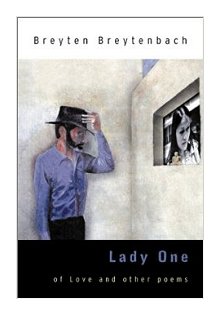 Kunst in de openbare ruimte: Openbare Kunst & Openbare Ruimte (BKOR) zorgt met regelmaat voor het voorzien van de ornamentenlijsten in de stad van nieuwe werken en voor het herstellen van de oude klassiekers. Onlangs werden de werken van Lucebert en van Breytenbach gerestaureerd. Dit was een directe aanleiding om een editie van het programma Z-Files, Kunst en de Stad te wijden aan de beide dubbeltalenten: Lucebert en Breytenbach waren beide zowel schilder als dichter. Poetry International en CBK Rotterdam nodigden Breyten Breytenbach voor deze gelegenheid uit om naar Rotterdam te komen. Hij zal de eregast zijn op deze bijzondere avond.
Kunst in de openbare ruimte: Openbare Kunst & Openbare Ruimte (BKOR) zorgt met regelmaat voor het voorzien van de ornamentenlijsten in de stad van nieuwe werken en voor het herstellen van de oude klassiekers. Onlangs werden de werken van Lucebert en van Breytenbach gerestaureerd. Dit was een directe aanleiding om een editie van het programma Z-Files, Kunst en de Stad te wijden aan de beide dubbeltalenten: Lucebert en Breytenbach waren beide zowel schilder als dichter. Poetry International en CBK Rotterdam nodigden Breyten Breytenbach voor deze gelegenheid uit om naar Rotterdam te komen. Hij zal de eregast zijn op deze bijzondere avond.
Platanus x hispanica / Graf van de Onbekende Dichter
woensdag 8 oktober, 17:00 uur
“Elk mens is een verborgen dichter”, met deze woorden doopte dichter Breyten Breytenbach tijdens het Poetry International Festival in 1986 de grote, statige plataan aan de Westersingel tot monument voor vrije gedachten. De boom werd omgedoopt tot ‘Graf van de Onbekende Dichter’. Bijna 30 jaar later, plaatst Poetry International een plaquette bij de boom waarmee de boom de status van officieel monument krijgt. Op 8 oktober om 17.00 uur wordt – in aanwezigheid van Breyten Breytenbach – de plaatsing van de plaquette gevierd. Aansluitend is er een feestelijk programma in boekhandel Van Gennep aan de Oude Binnenweg.
Breytenbach schreef tijdens zijn gevangenschap in Zuid-Afrika (1975-1982) een verhaal waarin hij sprak over ‘het graf van een dichter’. Een soort ontmoetingsplek waarnaar dichters een ‘pelgrimstocht’ konden ondernemen om er te ‘mediteren’. Want, zo was zijn gedachte, elk mens is een verborgen dichter. Er moet dus ergens op de wereld een plek zijn waar men zijn of haar gedachten de vrije loop kan laten. Na zijn vrijlating kon het verhaal van Breytenbach in samenwerking met de organisatie van Poetry International een plek krijgen aan de Westersingel.
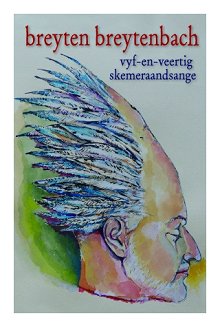 Z-Files, Kunst en de Stad: Lucebert en Breyten Breytenbach
Z-Files, Kunst en de Stad: Lucebert en Breyten Breytenbach
Met: Breyten Breytenbach en Kamagurka, gastheer: Ernest van der Kwast
Donderdag 9 oktober, 17:00 uur / WORM
Ernest van der Kwast praat met Breyten Breytenbach en andere gasten over het werk van Lucebert. Deze Z-Files wordt georganiseerd naar aanleiding van de renovatie van de muurschilderingen van zowel Lucebert als Breytenbach; beiden in de Gaffelstraat te Rotterdam.
The Z-Files, Kunst en de Stad is serie programma´s van SIR en BKOR (beiden onderdeel van het CBK Rotterdam) waarin kunst, openbare ruimte en de stad aan bod komen door middel van lezingen, presentaties en excursies. Doel van het programma is het onder de aandacht brengen van de bijzondere collectie kunstwerken in de openbare ruimte van Rotterdam en het belichten van actuele ontwikkelingen in de stad.
# Meer informatie op website Poetry International
fleursdumal.nl magazine
More in: # Archive S.A. literature, Archive A-B, Art & Literature News, Poetry International
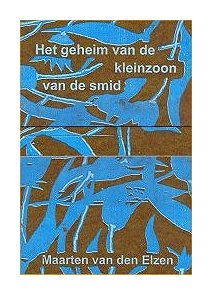 Hoenderbossche Verzen te Uden, werd in 1994 opgericht door Maarten Van Elzen (o.a. stadsdichter van Uden) samen met beeldend kunstenaar Genoveef Lukassen. De gedichten van Van den Elzen verschenen in een groot aantal bloemlezingen en verzamelbundels. Ook publiceerde hij in literaire tijdschriften als Schoon Schip, Kruispunt-Summier, Yang, Houten Gong, Maatstaf en Millennium.
Hoenderbossche Verzen te Uden, werd in 1994 opgericht door Maarten Van Elzen (o.a. stadsdichter van Uden) samen met beeldend kunstenaar Genoveef Lukassen. De gedichten van Van den Elzen verschenen in een groot aantal bloemlezingen en verzamelbundels. Ook publiceerde hij in literaire tijdschriften als Schoon Schip, Kruispunt-Summier, Yang, Houten Gong, Maatstaf en Millennium.
Twintig jaar Uitgeverij Hoenderbossche Verzen
Donderdag 9 oktober 2014 is het exact twintig jaar geleden dat Uitgeverij Hoenderbossche Verzen van start ging met de dichtbundel ‚Donkerstraat’ de eerste dichtbundel in een drieluik van de dichter Eddie Besselsen met een fraai omslag van José Heerkens.
Op 9 oktober wordt om 16.00 uur het 35ste gedicht onthuld, ‘De wereld lag aan onze jongensvoeten’, in de Udense Poëzie- en Kunstroute aan de Udense Kerkstraat op de voormalige speelplaats van de voormalige Petrusschool (waar Maarten van den Elzen naar de lagere school ging tussen 1961 en 1968).
Vanaf 16.45 uur wordt de viering van het twintigjarig jubileum van Uitgeverij Hoenderbossche Verzen voortgezet in het Museum voor Religieuze Kunst onder het genot van live muziek, optredende dichters, en sprekers als Dichter Jasper Mikkers/Tymen Trolsky en Filosoof Charles Vergeer.
Bovendien wordt op deze avond de elfde dichtbundel van Maarten van den Elzen gepresenteerd (onder de (voorlopige) titel LX – XL). Ruim dertig gedichten geheel uitgebracht in zeefdruk met afbeeldingen, zoals altijd van de hand van Genoveef Lukassen. Uiteraard is het ook mogelijk tijdens dit feest de tentoonstelling ‘Franciscus en de natuur’ te bezoeken.
Uitgeverij Hoenderbossche Verzen gaf behalve veertig dichtbundels met grafiek, fotografie, tekeningen, cd’s (waarvan er o.a. 20 werden aangekocht door Museum Meermanno in Den Haag ook nog eens een aantal Poëzieroute’s uit o.a. van Boxtel/Liempde, Schijndel, het Oventje (gemeente Landerd) en Uden met werk van 13 dichters waaronder H.H. ter Balkt, Mark Boog, Jasper Mikkers/Tymen Trolsky, Victor Vroomkoning, Maarten van den Elzen, Eddie Besselsen, Y. Né, Albert Megens, Joris Ivens, Hannie Rouweler en JACE van de Ven. Inmiddels zijn er 77 gedichten geplaatst in de openbare ruimte van dertien gemeenten in Noord-Brabant.
# Meer informatie website Hoenderbossche Verzen
fleursdumal.nl magazine
More in: - Book News, Art & Literature News, City Poets / Stadsdichters, Elzen, Maarten van den
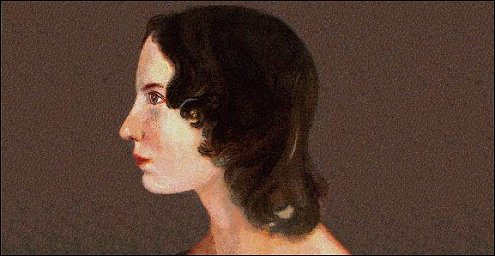
Emily Jane Brontë
(1818-1848)
Faith and Despondency
“The winter wind is loud and wild,
Come close to me, my darling child;
Forsake thy books, and mateless play;
And, while the night is gathering gray,
We’ll talk its pensive hours away;–
“Ierne, round our sheltered hall
November’s gusts unheeded call;
Not one faint breath can enter here
Enough to wave my daughter’s hair,
And I am glad to watch the blaze
Glance from her eyes, with mimic rays;
To feel her cheek, so softly pressed,
In happy quiet on my breast,
“But, yet, even this tranquillity
Brings bitter, restless thoughts to me;
And, in the red fire’s cheerful glow,
I think of deep glens, blocked with snow;
I dream of moor, and misty hill,
Where evening closes dark and chill;
For, lone, among the mountains cold,
Lie those that I have loved of old.
And my heart aches, in hopeless pain,
Exhausted with repinings vain,
That I shall greet them ne’er again!”
“Father, in early infancy,
When you were far beyond the sea,
Such thoughts were tyrants over me!
I often sat, for hours together,
Through the long nights of angry weather,
Raised on my pillow, to descry
The dim moon struggling in the sky;
Or, with strained ear, to catch the shock,
Of rock with wave, and wave with rock;
So would I fearful vigil keep,
And, all for listening, never sleep.
But this world’s life has much to dread,
Not so, my Father, with the dead.
“Oh! not for them, should we despair,
The grave is drear, but they are not there;
Their dust is mingled with the sod,
Their happy souls are gone to God!
You told me this, and yet you sigh,
And murmur that your friends must die.
Ah! my dear father, tell me why?
For, if your former words were true,
How useless would such sorrow be;
As wise, to mourn the seed which grew
Unnoticed on its parent tree,
Because it fell in fertile earth,
And sprang up to a glorious birth–
Struck deep its root, and lifted high
Its green boughs in the breezy sky.
“But, I’ll not fear, I will not weep
For those whose bodies rest in sleep,–
I know there is a blessed shore,
Opening its ports for me and mine;
And, gazing Time’s wide waters o’er,
I weary for that land divine,
Where we were born, where you and I
Shall meet our dearest, when we die;
From suffering and corruption free,
Restored into the Deity.”
“Well hast thou spoken, sweet, trustful child!
And wiser than thy sire;
And worldly tempests, raging wild,
Shall strengthen thy desire–
Thy fervent hope, through storm and foam,
Through wind and ocean’s roar,
To reach, at last, the eternal home,
The steadfast, changeless shore!”

Ellis Bell ( Emily Brontë) poetry
fleursdumal.nl magazine
More in: Anne, Emily & Charlotte Brontë, Archive A-B, Brontë, Anne, Emily & Charlotte
Anna de Noailles
(1876-1933)
A la nuit
Nuits où meurent l’azur, les bruits et les contours,
Où les vives clartés s’éteignent une à une,
Ô nuit, urne profonde où les cendres du jour
Descendent mollement et dansent à la lune,
Jardin d’épais ombrage, abri des corps déments,
Grand coeur en qui tout rêve et tout désir pénètre
Pour le repos charnel ou l’assouvissement,
Nuit pleine des sommeils et des fautes de l’être,
Nuit propice aux plaisirs, à l’oubli, tour à tour,
Où dans le calme obscur l’âme s’ouvre et tressaille
Comme une fleur à qui le vent porte l’amour,
Ou bien s’abat ainsi qu’un chevreau dans la paille,
Nuit penchée au-dessus des villes et des eaux,
Toi qui regardes l’homme avec tes yeux d’étoiles,
Vois mon coeur bondissant, ivre comme un bateau,
Dont le vent rompt le mât et fait claquer la toile !
Regarde, nuit dont l’oeil argente les cailloux,
Ce coeur phosphorescent dont la vive brûlure
Éclairerait, ainsi que les yeux des hiboux,
L’heure sans clair de lune où l’ombre n’est pas sûre.
Vois mon coeur plus rompu, plus lourd et plus amer
Que le rude filet que les pêcheurs nocturnes
Lèvent, plein de poissons, d’algues et d’eau de mer
Dans la brume mouillée, agile et taciturne.
A ce coeur si rompu, si amer et si lourd,
Accorde le dormir sans songes et sans peines,
Sauve-le du regret, de l’orgueil, de l’amour,
Ô pitoyable nuit, mort brève, nuit humaine !…
Anna de Noailles poetry
fleursdumal.nl magazine
More in: Archive M-N, Noailles, Anna de

The Sorrows of Young Werther (59) by J.W. von Goethe
About ten in the morning, Werther called his servant, and, whilst he
was dressing, told him that in a few days he intended to set out upon
a journey, and bade him therefore lay his clothes in order, and prepare
them for packing up, call in all his accounts, fetch home the books
he had lent, and give two months’ pay to the poor dependants who were
accustomed to receive from him a weekly allowance.
He breakfasted in his room, and then mounted his horse, and went to
visit the steward, who, however, was not at home. He walked pensively
in the garden, and seemed anxious to renew all the ideas that were most
painful to him.
The children did not suffer him to remain alone long. They followed him,
skipping and dancing before him, and told him, that after to-morrow and
tomorrow and one day more, they were to receive their Christmas gift
from Charlotte; and they then recounted all the wonders of which they
had formed ideas in their child imaginations. “Tomorrow and tomorrow,”
said he, “and one day more!” And he kissed them tenderly. He was going;
but the younger boy stopped him, to whisper something in his ear. He
told him that his elder brothers had written splendid New-Year’s wishes
so large! one for papa, and another for Albert and Charlotte, and one
for Werther; and they were to be presented early in the morning, on
New Year’s Day. This quite overcame him. He made each of the children
a present, mounted his horse, left his compliments for papa and mamma,
and, with tears in his eyes, rode away from the place.
He returned home about five o’clock, ordered his servant to keep up
his fire, desired him to pack his books and linen at the bottom of the
trunk, and to place his coats at the top. He then appears to have made
the following addition to the letter addressed to Charlotte:
“You do not expect me. You think I will obey you, and not visit you
again till Christmas Eve. O Charlotte, today or never! On Christmas Eve
you will hold this paper in your hand; you will tremble, and moisten it
with your tears. I will–I must! Oh, how happy I feel to be determined!”
In the meantime, Charlotte was in a pitiable state of mind. After her
last conversation with Werther, she found how painful to herself it
would be to decline his visits, and knew how severely he would suffer
from their separation.
She had, in conversation with Albert, mentioned casually that Werther
would not return before Christmas Eve; and soon afterward Albert went
on horseback to see a person in the neighbourhood, with whom he had to
transact some business which would detain him all night.
The Sorrows of Young Werther (Die Leiden des jungen Werther) by J.W. von Goethe. Translated by R.D. Boylan.
To be continued
fleursdumal.nl magazine
More in: -Die Leiden des jungen Werther, Goethe, Johann Wolfgang von
Martin
Beversluis
Opdracht
kronkel door bergen naar beneden
op zoek naar eindeloos laagland
want daarachter wil je zijn
verover moeizaam meter na meter
wees bereid terstond op te geven
het is niet van jou
je hebt het te leen
ga niet meer langs start zoek niet
om te vinden vloei traag door het
landschap geef leven zodoende
verander met de tijd van zoet
in zout bevrijd van identiteit
kronkel vloeibaar en vermeng
verder tot je de zee zelf bent.
Martin Beversluis
fleursdumal.nl magazine
More in: Archive A-B, Beversluis, Martin
Bert
Bevers
Ruster aan de Aude / Ode aan de ruster
21 juli – Rustdag in Carcassonne
Over de vallei van de Aude zijgt
een luwte als van ezelinnenadem.
Hier, in de andere kant van juli,
mag hij even uithijgen. Hij weet
dat ze gijzelaars in avonturen zijn,
complotteurs op jacht naar dagsucces.
Eigenlijk zou hij het liefst een rivier zijn
nu. Een met een kleine waterval erin.
Bert Bevers
(uit: GeelZucht V, De Letterloods, Puyvelde, september 2014)
More in: Archive A-B, Bevers, Bert
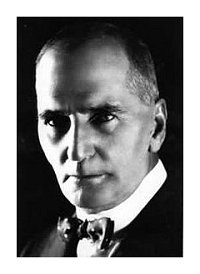
Eugène Marais
(1871–1936)
Sonder betaling
Dis kleine dingetjies wat meeste vreugde bring:
van kindertjies wat speel, dié bly gelag;
‘n lewerik wat in wolke sing;
die sag’ bedruis van druppels in die nag.
Swart doringbome teen die Westegloed;
die groen van wuiwend’ gras wat hoog die bult omsoom;
lang lelies in die gras, nes druppels bloed;
die dof’ gemurmel van ‘n waterstroom.
‘n Sware werk goed afgedaan;
‘n wandeling met ‘n vriend wat ons bemin;
die eerste groen langs muur en laan;
die gloed van uit ‘n liefdevolle huisgesin;
die blydskap, uitgestort en vry,
loop on op eensaam’ wege raak.
Dit kos alleen die soek om te verkry:
die dinge wat die Lewe ‘n vreugde maak.
Eugène Marais poetry
fleursdumal.nl magazine
More in: Archive M-N, Eugène Marais, Marais, Eugène
Thank you for reading Fleurs du Mal - magazine for art & literature